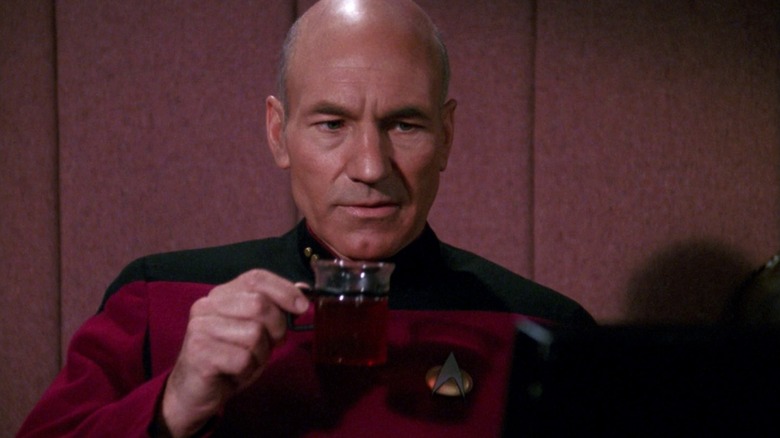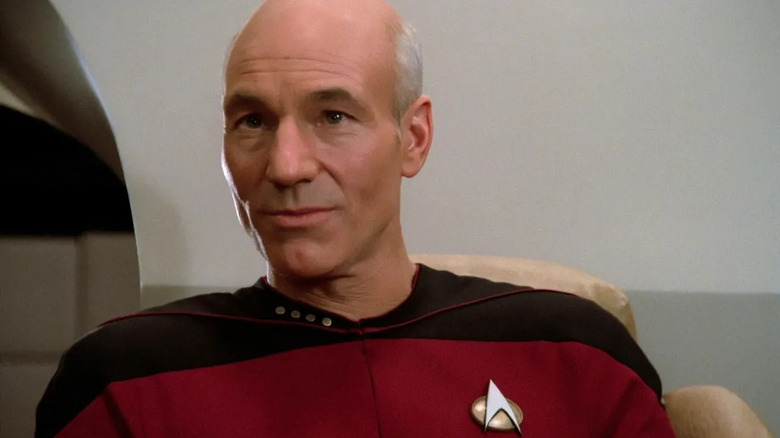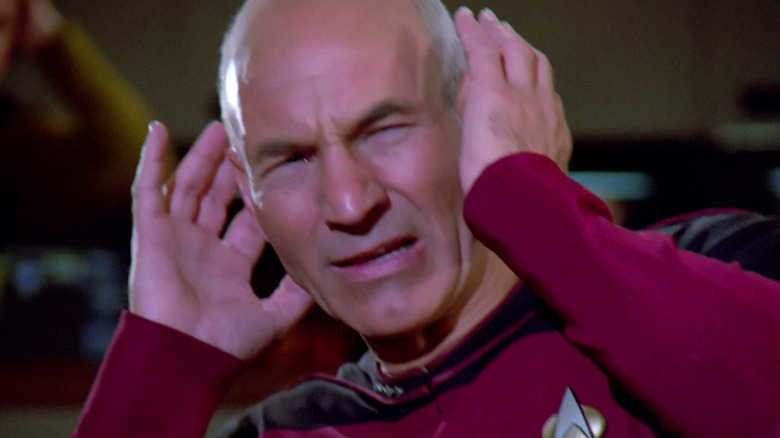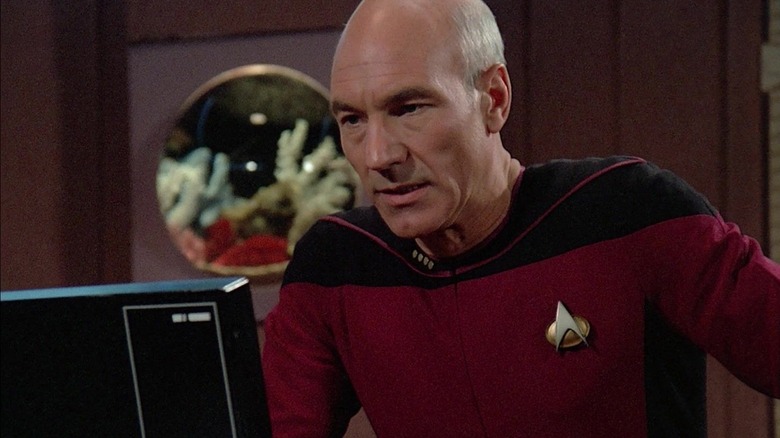Patrick Stewart's First Star Trek Meeting Went As Badly As You Can Imagine
In the late 1980s, just prior to when Patrick Stewart was alerted to the existence of "Star Trek," the actor was at a crossroads. He had been touring England with a production of "Who's Afraid of Virginia Woolf?" and it wasn't going terribly well. He was already 46, he hadn't really found what he considered to be a major breakout role, and he was starting to consider that he simply wasn't ever going to do better than he already had. Middle age brought about the usual malaise, and Stewart seemingly felt idle.
Stewart recalled this time in his new autobiography "Making It So: A Memoir." He recalled taking a job in Los Angeles wherein he would merely read lines of Shakespeare to accompany a series of public lectures at UCLA's Royce Hall. Stewart wasn't giving the lectures. That would be a friend and confidant of Stewart's named David Rodes. Stewart said that his pay for the Shakespeare gig was to be a mere $100 and a dinner at the local T.G.I. Fridays. He wasn't doing it for the money but for an excuse to visit L.A. and to get away from the "Virginia Woolf" production.
It seems that the UCLA gig caught the attention of an American TV producer, as Stewart received a call from his American agent the following morning. Evidently, a man named Robert Justman happened to be in attendance at Royce Hall and was taken by Stewart's talents. Justman, Trekkies may know, was a supervising producer on both "Star Trek" and "Star Trek: The Next Generation." Justman said that Stewart should talk to a man named Gene Roddenberry about an upcoming TV project.
Stewart, it seems, didn't know who Gene Roddenberry was. The subsequent meeting with him, then, was brief and awkward.
Who the heck is Jean Roddanburry?
Stewart, a classically trained actor, had a very loose grasp on popular culture. He admits that he thought the musician Sting played the double bass for a policeman's band. He vaguely recalled "Star Trek" passing through his consciousness as a young man, as relatives of his would occasionally be watching it in rooms he would only briefly pass through. Indeed, he recalled the title to be "Star Track" or "Star Walk" or something like that. When Stewart's American agent said he should meet with Gene Roddenberry, he assumed it was spelled Jean Roddanburry. And he knew nothing about Jean Roddanburry.
His agent explained patiently what "Star Trek" was. Stewart wrote:
"[A]s if speaking to a small child, [my agent, Steve Dontanville] connected the dots for me. Paramount Pictures, the famous Hollywood studio, was creating an all-new version of 'Star Trek' to be called 'Star Trek: The Next Generation,' its action taking place nearly a hundred years after the adventures of William Shatner's Captain Kirk and Leonard Nimoy's Spock, with a whole new cast of characters. [...] I was to report to [Roddenberry's] home at eleven a.m. that very morning, which gave me just enough time to collect my bearings, brush my teeth, and go."
Thus ill-prepared, Stewart drove over to Roddenberry's house so that he could meet with the show's creator and a few producers. Not only was Stewart ignorant of what he was expected to do or say at this meeting, but he wasn't entirely impressed with the date '70s decor in Roddenberry's home.
The meeting went very poorly.
The awful green carpet
This wasn't an audition, mind you. It was a mere introduction. It seems that casting for "Star Trek: The Next Generation" was in its very early stages, and Roddenberry had a very clear idea as to what he wanted the role of Jean-Luc Picard to be ... and Stewart most decidedly wasn't it. He remembered the drive:
"I drove my rental car to a house somewhere in the Hollywood Hills. It was a single-story, 1950s-era house, very ordinary-looking, even in need of some TLC. When I knocked on the door, it was opened by a smiling, silver-haired man who introduced himself as Robert Justman. As I stood on the welcome mat, he told me how much he had liked the Royce Hall event and the many parts I played in it. Then he led me into the house."
Children of the '70s and '80s can likely picture what Stewart described next. Many of us played on thick shag carpeting as children, and the musty smell of the material, even when well-maintained was pervasive and unique. An odiferous sense-memory wafts off of the page as Stewart wrote:
"I noticed that throughout the structure — in the hallway, the living room, and every other space I glimpsed — the floors were covered in thick shag-pile carpet in a nauseating shade of green. Waiting for me in the living room were two other men. One of them, tall and burly, struggled to get out of his armchair to shake my hand. He introduced himself to me as Gene Roddenberry."
Roddenberry had green shag carpeting in his home. I suppose there's no accounting for taste.
In and Out, a California tradition
The meeting was quick, strange, and bad. Stewart was essentially rejected before he had a chance to say much. He recalls being happy to have gotten out of there. He wrote:
"It was all very awkward. A few pleasantries were exchanged among us, but I was not invited to sit down. Indeed, it was a matter of mere minutes before Roddenberry called the conversation to a halt, turning to me abruptly and saying, 'Thanks for coming.' Clearly, the meeting was over. Robert Justman escorted me to the door and again warmly shook my hand. He was lovely, but the whole experience had felt very uncomfortable and I was relieved to get out."
Stewart's name never dropped off of casting lists, even though Roddenberry clearly hated him for the part of Captain Picard. It was later revealed to the actor that Roddenberry was quoted as saying "Patrick Stewart's name should never, ever be mentioned in my presence again!" Yikes. Stewart left the meeting, contemplating becoming a championship squash player instead of an actor. It took him months of consideration to think that pursuing TV or film in America might be a good move for his career. "What about Hollywood?" he asked himself.
The first impression was a bad one, but Stewart would go on to play Jean-Luc Picard in seven seasons of "Star Trek: The Next Generation," in four "Star Trek" feature films, and in three seasons of "Star Trek: Picard." For a moment, it seemed that Stewart would forever associate "Star Trek" with green shag carpets and an awkward meeting with some bloke in a run-down Hollywood home.



